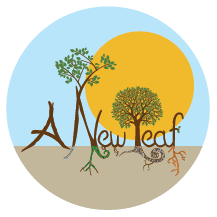Reggio Leads The Way
Once upon a time
A New Leaf staff with Lella Gandini (in blue), Reggio Children’s United States Liaison for the Dissemination of the Reggio Emilia Approach
Mothers were hammering old mortar from bricks from war-torn buildings, while fathers sold an abandoned German tank, a few trucks, and horses. Their goal was clear: to put the past behind and to invest in their hopes for a better future. After years of horrible times, they knew what mattered most, they were working to create a better school for children. The educator and psychologist Loris Malaguzzi heard of this effort that broke all rules and protocols. Could it be true? He got on his bike to go and find out in 1945, and he journeyed on this road with the people of Reggio Emilia for the rest of his life. The Loris Malaguzzi Center is a tribute to his visionary work, and to the enormous contribution of the Reggio Emilia experience to the field of Early Childhood education. Educators who worked with him and others that followed continue to innovate and advocate for children's rights all over the world. We are thankful and inspired!
Features of the Reggio Emilia Philosophy
Image of the child: capable, protagonist, constructivist, with 100 languages
Image of the educator: co-researcher, listener, participant, negotiator
Curriculum: progettazione (not programmazione), emerging from interests of the group, studying with making models in labs and studios, considering many points of view, open ended, creating transformations
Environment: intentional, prepared, aesthetically pleasing, the child’s third teacher
Pedagogical documentation: to make the learning visible to educators, children, parents, society, the world – meant to create dialogues
Collaborations: teachers, atelierista, pedagogista, parents, city, world
Innovation: changing roles and goals of education – nothing without joy!
What does it mean to be a Reggio inspired school?
It means we, too, have embarked on the journey of education informed by the history and research that has been done and continues in Reggio Emilia. It means that we are re-contextualizing their experience to apply it to ours for the benefit of children. It means a transformation for the educators, a shift in focus from teacher control or guidance to a pedagogy of listening to the whole child. Here, children are the protagonists in their learning journey with the contribution of our experiences and resources. That is why we keep a good travel journal. We uncover children's strategies for exploration, we listen to their voices, and transmit their words, valuing their ideas. In fact, documentation is the engine of our education. It is the starting point for our projected curriculum, and the respectful assessment tool to evaluate learning.
In our role as educators, we do not stand aside and judge children – rather, we engage in learning together as co-researchers, and we share the role of teacher in loaning knowledge to each other. We also treat the environment as a teacher, and we take great care in the selection of materials that have the power to stimulate and be transformed. Within the rich environment, we form a circle of relationships that nurtures thinking, exchanges of ideas, exploration, inquiry, questioning, the development of projects, creativity, and friendships. We support the learning cycle as we mirror, scaffold, provoke, challenge, and re-contextualize learning opportunities through time. For enabling creativity, negotiating meaning, and supporting the competent child, we are in constant evaluation, research, and improvement of our environment and strategies.

